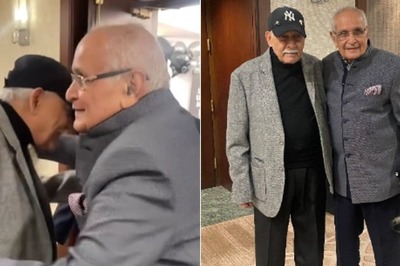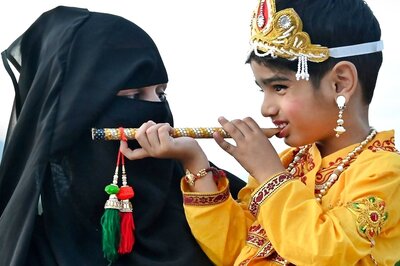
views
The results of the five assembly elections — including the three Hindi heartland states of Rajasthan, Madhya Pradesh and Chhattisgarh, which were until now under the BJP — have come as a shot in the arm for Congress president Rahul Gandhi, who was desperately in need of a credible electoral victory to disprove his critics who maintained he is politically immature.
Though the Congress would have been happy with a victory in two of the three Hindi heartland states, its emphatic win in Chhattisgarh proved to be the proverbial icing on the cake. There is no doubt that the Congress was expected to do far better in Rajasthan and Madhya Pradesh but Rahul Gandhi can draw comfort from the fact that the party is on a path of revival in states where it is pitted directly against the BJP.
Rahul Gandhi’s record in delivering electoral victories, so far, has been dismal, which has given rise to questions on his leadership capabilities and the overwhelming perception that the party will continue on its downward slide under him.
Though Rahul Gandhi did come close to unseating the three-term BJP government in Gujarat, he eventually had to console himself with the fact that the Congress succeeded in bringing down the saffron party’s numerical strength in the assembly to less than 100.
Similarly, the new Congress chief could not ensure a second term for the party in Karnataka but he made up for this by keeping the rival BJP out of power, even if it was at the cost of playing second fiddle to a much smaller regional party.
Given this backdrop, the results of the five assembly elections were being eagerly awaited by the Congress cadre and the public at large.
Coming a year after Rahul Gandhi was elected Congress president, these elections were a test of his leadership and his ability to resurrect the party after a string of losses. To that extent, these results will consolidate Rahul Gandhi’s hold over the party, energise the Congress rank and file and send out a message that Prime Minister Narendra Modi is not invincible.
No doubt, the Congress is back in the game and Rahul Gandhi has proved he can no longer be dismissed as a political novice. But the Congress president still has a long distance to go. The task of forging winning alliances with regional satraps and bringing together a disparate group of political parties on a common platform for the 2019 Lok Sabha election remains as daunting as ever.
As a pan-Indian party, which is the main challenger to the BJP in several North Indian states, regional parties have no choice but to accept the Congress as the anchor of the opposition alliance being put together for the 2019 Lok Sabha elections.
However, the regional parties are also wary of doing business with Rahul Gandhi. This could well change now but to improve his acceptability with potential allies, Rahul Gandhi will have to walk the extra mile to establish a personal rapport with them. Here, he could well learn from his mother and former Congress president Sonia Gandhi, who made a special effort to stitch up alliances in the run-up to the 2004 Lok Sabha elections. She had walked across to Ram Vilas Paswan’s residence, dropped in for a cup of tea with Sharad Pawar and touched base with DMK patriarch M Karunanidhi despite their antagonistic past.
In Rahul Gandhi’s case, it is imperative that he extend a hand of friendship to Bahujan Samaj Party chief Mayawati and West Bengal chief minister Mamata Banerjee and reconnect with Samajwadi Party leader Akhilesh Yadav, who have decidedly been cold to him. This was evident when the opposition parties met in Delhi on the eve of the winter session of Parliament to discuss how they can work together in the next general election. Though the line-up of leaders was impressive, the absence of Mayawati and Akhilesh Yadav was a pointer to the difficulties which lie ahead in forging an anti-BJP alliance.
Mamata Banerjee did attend the meeting but made sure that she was not in the same frame as Rahul Gandhi when he briefed the media later about their deliberations. The Trinamool Congress leader left after speaking separately to the waiting presspersons.
After failing to seal a deal with the BSP in these elections, the Congress moved quickly to make amends by reaching out to what are often described as “like-minded” parties in Rajasthan and Madhya Pradesh with an offer to work together. But this does not mean that Mayawati will suddenly become more amenable to the Congress. She will live up to her reputation and play hardball, especially in Uttar Pradesh where the Congress is a bit player and the BSP a dominant political force.
It is the same story in West Bengal, Tamil Nadu, and Bihar. The Congress has a negligible presence in these states and it cannot afford to scale up its demands here on the basis of its performance in Rajasthan, Madhya Pradesh, and Chhattisgarh. It will have to take a more pragmatic view in its seat-sharing negotiations and, more importantly, Rahul Gandhi will have to reassure the regional satraps that he is not a claimant for the Prime Minister’s post. That would help gain their confidence and establish a healthy working relationship with them.
(The author is senior journalist, views are personal)




















Comments
0 comment